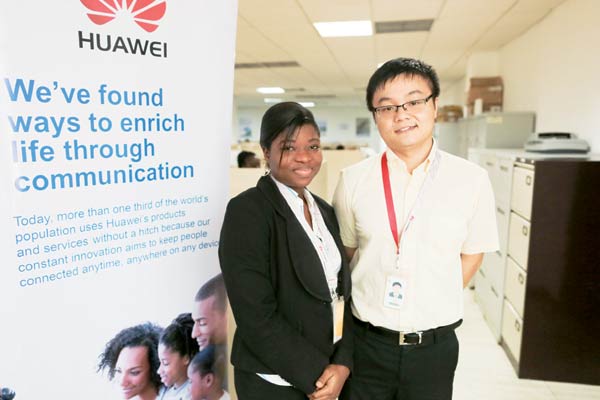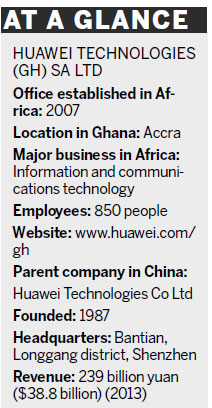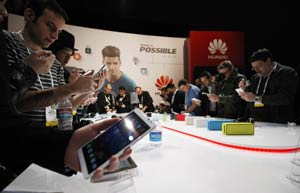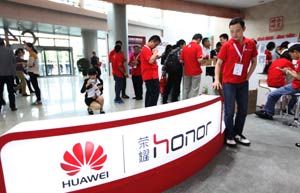 |
|
Geoffrey Li (right), public relations manager for Huawei Technologies Ghana, and Ruby Boateng, a compensation and benefits specialist, at Huawei's Ghana company.LOUISE BURKE/CHINA DAILY |
Huawei phones are making Internet access more affordable
Exhaust fumes and the heavy scent of bitumen warming under the tropical sun waft through the open windows of the taxi.
Head porters and phone card sellers make their way up the rows of vehicles, vying for customers in Accra's morning rush hour.
They sing out as they go: "Vodafone! MTN! Tigo! Airtel! GLO!"
The vendors wear gaudy advertising vests in the colors of the telecom companies as they sell the scratch cards, often for as little as 1 Ghana cedi ($0.26) a piece.
The street vendors are the public face of one of the fastest growing industries in Ghana, where a flood of cheap smartphones is bringing down the cost of mobile Internet access and stimulating the telecommunications industry.

The number of mobile data subscribers in Ghana has been rocketing up at an annual rate of almost 40 percent.
As the traffic moves along, MTN billboards loom overhead. The slogans read: "Love to browse?" and "My first smartphone". The latter is an advertisement for a 150 cedi smartphone from Huawei.
The Chinese technology giant is leading the push to make communications in West Africa affordable, in turn carving out a substantial share of the market for its products and services.
Geoffrey Li, public relations manager for Huawei Technologies Ghana, says the company is the major equipment and services provider to MTN, Vodafone and other leading telecom operators.
"Because Ghana is a developing country, most of the population cannot afford very costly communication equipment," Li says. "Of course, now is the information century, so if more and more people can communicate efficiently, society and the economy could benefit from it."
Li says communications costs were high when Huawei first ventured into Ghana in 2001.
"After we came, because of our cost-effective products, the market was more competitive," he says. "Communication costs became more affordable.
"In Ghana you can make calls to outside countries, and the cost is even cheaper than in China and many other countries.
"That's an impact we made after we came to the market."
Occupying several floors in one of the few high-rise buildings in Osu, Accra's shopping and nightlife district, Huawei employees have a good view of the city's most popular street. Below, a multitude of phone company advertising umbrellas of red, green, yellow and blue adorn stalls along the dusty sides of Oxford Street.
Since Huawei registered as a local business in Ghana in 2007, it has been on a development fast track, with the employee count now at 850.
One of the most successful initiatives this year has been the introduction of the Ascend Y220 smartphone, sold for 150 cedis in a package deal with Ghana's biggest telecom services provider, MTN.
Sales have reached 70,000 phones since the affordable model was introduced in February. The deal was so popular that the first shipment of phones sold out.
Li says smartphones will be a key focus for Huawei in Ghana over the next few years.
"Smartphones are becoming more and more popular in this country. We collaborated with MTN to launch a smartphone that is very competitive in terms of price.
 |
 |
|
|
|
